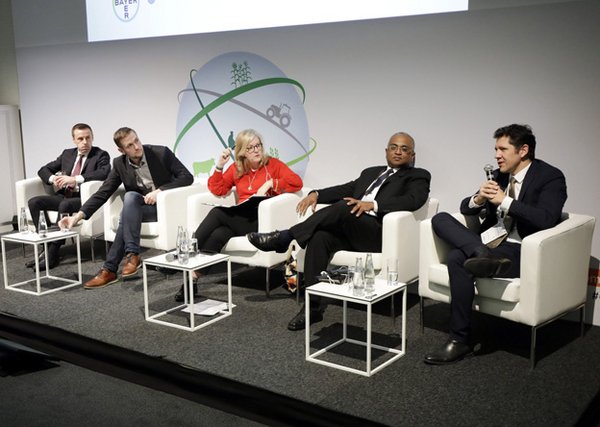- Share this article
- Subscribe to our newsletter
Digital transformation – who are the winners?
The chief argument in favour of transforming the agricultural sector is that digital tools can help to enhance production without putting natural resources under excessive strain. But how exactly do the individual participants in the value chain benefit from this? The GFFA e.V. aimed to answer this question at its Economic Forum, which took place in Berlin/Germany in late January in the context of the Global Forum for Food and Agriculture. “Digital transformation in the global agri and food business – prospects and challenges for entrepreneurs” was the title of the meeting, to which the organisers had invited farmers from the Global North and South as well as representatives from the upstream and downstream areas.
Better raw material and a better work-life balance
“Having ensured supply is in the interest of the food industry. To me, digitisation is a support tool that helps the farmers to produce better raw material,” said Stefan Canz, Nestlé Corporate Agriculture Lead on Water. In his activity area, this means, for example, the development of a weather app which provides smallholder cocoa producers with irrigation recommendations and information on Good Agricultural Practice.
“Today, the benefits for the farmer and the environment are much clearer than for business,” maintained Liam Condon, President of the Crop Science Division at Bayer AG. “Digitisation allows us to move from an inputs-based business model to an outcomes-based business model in which we are paid for what we create on the farm.”
“My scarcest factor is time, and here, the digital solutions of the last few years have helped me a lot,” said Andreas Dörr, who runs a 1,000-hectare farm in Thüringen. In concrete terms, this means that the first thing the young farmer does in the morning is to get his mobile and check the weather app and the farm’s webcam and then call up the stock exchange grain prices. His chief reasons to use digital tools are more time for important things to be done and a reasonable work-life balance.
Linking small farmers to logistics
“Our approach is not business first, which would be the usual in business relations, but farmers first,” said Ajit Mathai, founding partner of mByom, a consulting and management services provider based in Chennai/India. This company has developed “A-Hope” – The App for homestead sustainable agriculture produce procurement and e-Payment, which is a platform for small-scale farmers. Via this App, the farmers are directly linked to logistics despite their fragmented landholdings and thus have access to farm supply, processors and sales markets, but also to banks – “microprocurement, instant credit, e-payment”, as Mathai summarised the elements of the system in Berlin. According to him, this enables small farmers to get money for small volumes of diverse produce. The system guarantees all participants in the chain traceability, quality control and transparency, Mathai maintained. In general, digital solutions offered good opportunities to stop migration to the cities and get youth – the digital natives – back to the farms, the entrepreneur told the audience.
Fairly distributing benefits
So much for the advantages of digitisation. What about the challenges? The issue of data security and data sovereignty is certainly one of the most important aspects. Here, the use of metadata, i.e. data describing other data, is viewed especially critically. “We do not use the data that we gather for pricing policies,” Liam Condon assured the meeting. However, the use of metadata was essential in achieving a solid outcome. Condon referred to field trials that his company was conducting with farmers in an area of 70,000 hectares in the USA. The aim was to apply artificial intelligence to determine which variety of a crop was best suited for a specific field. Provided that value added developed in the shape of yield increases, “we say that two thirds should belong to farmers and one third to us,” Condon explained.
Farmer Andreas Dörr,who already opted for digital solutions on his farm in 1998, views the issue of data pragmatically. “When sensitive business data such as leasehold agreements is concerned, data security is very important to me,” Dörr explained. “But it is not a problem in networking machine data, when for example I can use my App to improve the algorithms to identify weeds, or when the farm machinery producer uses the data to improve the machines.”
Are farmers really the ones to decide?
“Isn’t there a danger of you, as a farmer, ultimately becoming an employee operating between supply and sales and Bayer and Nestlé reaping the profits?” a member of the audience asked. “Of course I want to stay the operating manager and make the business decisions,” Dörr stated. Here, the farm manager’s abilities were crucial. “We must not get into a situation where the farmer buys a black box that he no longer understands,” he warned.
The GFFA Berlin e.V. hosts the German agriculture and food industry network in the framework of the Global Forum for Food and Agriculture Berlin (GFFA). The Association was founded in 2011. Its members are the German Agricultural Society (DLG), the German Farmers’ Association (DBV), the Federation of German Food and Drink Industries (BVE), the German Eastern Business Association and Deutsche Gesellschaft für Internationale Zusammenarbeit (GIZ). The Global Forum for Food and Agriculture takes place annually in the framework of the International Green Week.
Silvia Richter, editor, Rural 21
More information:





Add a comment
Be the First to Comment